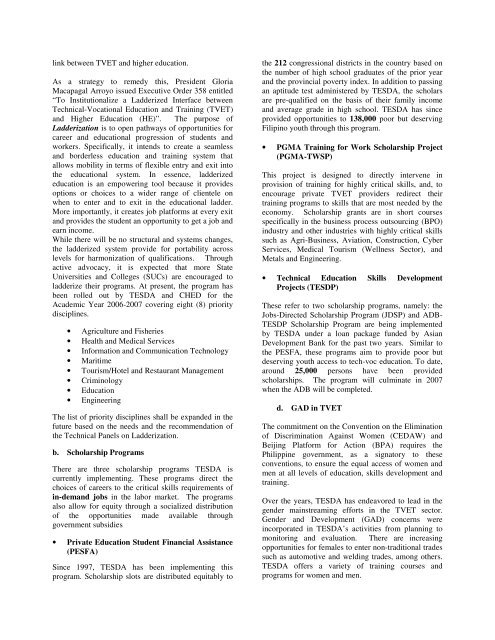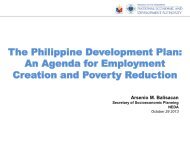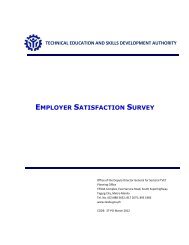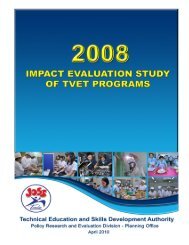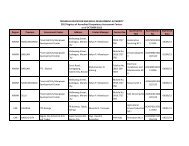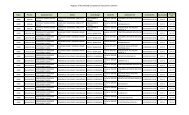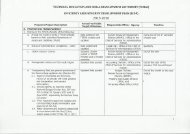The Philippine Technical Vocational Education and Training (TVET ...
The Philippine Technical Vocational Education and Training (TVET ...
The Philippine Technical Vocational Education and Training (TVET ...
Create successful ePaper yourself
Turn your PDF publications into a flip-book with our unique Google optimized e-Paper software.
link between <strong>TVET</strong> <strong>and</strong> higher education.<br />
As a strategy to remedy this, President Gloria<br />
Macapagal Arroyo issued Executive Order 358 entitled<br />
“To Institutionalize a Ladderized Interface between<br />
<strong>Technical</strong>-<strong>Vocational</strong> <strong>Education</strong> <strong>and</strong> <strong>Training</strong> (<strong>TVET</strong>)<br />
<strong>and</strong> Higher <strong>Education</strong> (HE)”. <strong>The</strong> purpose of<br />
Ladderization is to open pathways of opportunities for<br />
career <strong>and</strong> educational progression of students <strong>and</strong><br />
workers. Specifically, it intends to create a seamless<br />
<strong>and</strong> borderless education <strong>and</strong> training system that<br />
allows mobility in terms of flexible entry <strong>and</strong> exit into<br />
the educational system. In essence, ladderized<br />
education is an empowering tool because it provides<br />
options or choices to a wider range of clientele on<br />
when to enter <strong>and</strong> to exit in the educational ladder.<br />
More importantly, it creates job platforms at every exit<br />
<strong>and</strong> provides the student an opportunity to get a job <strong>and</strong><br />
earn income.<br />
While there will be no structural <strong>and</strong> systems changes,<br />
the ladderized system provide for portability across<br />
levels for harmonization of qualifications. Through<br />
active advocacy, it is expected that more State<br />
Universities <strong>and</strong> Colleges (SUCs) are encouraged to<br />
ladderize their programs. At present, the program has<br />
been rolled out by TESDA <strong>and</strong> CHED for the<br />
Academic Year 2006-2007 covering eight (8) priority<br />
disciplines.<br />
• Agriculture <strong>and</strong> Fisheries<br />
• Health <strong>and</strong> Medical Services<br />
• Information <strong>and</strong> Communication Technology<br />
• Maritime<br />
• Tourism/Hotel <strong>and</strong> Restaurant Management<br />
• Criminology<br />
• <strong>Education</strong><br />
• Engineering<br />
<strong>The</strong> list of priority disciplines shall be exp<strong>and</strong>ed in the<br />
future based on the needs <strong>and</strong> the recommendation of<br />
the <strong>Technical</strong> Panels on Ladderization.<br />
b. Scholarship Programs<br />
<strong>The</strong>re are three scholarship programs TESDA is<br />
currently implementing. <strong>The</strong>se programs direct the<br />
choices of careers to the critical skills requirements of<br />
in-dem<strong>and</strong> jobs in the labor market. <strong>The</strong> programs<br />
also allow for equity through a socialized distribution<br />
of the opportunities made available through<br />
government subsidies<br />
• Private <strong>Education</strong> Student Financial Assistance<br />
(PESFA)<br />
Since 1997, TESDA has been implementing this<br />
program. Scholarship slots are distributed equitably to<br />
the 212 congressional districts in the country based on<br />
the number of high school graduates of the prior year<br />
<strong>and</strong> the provincial poverty index. In addition to passing<br />
an aptitude test administered by TESDA, the scholars<br />
are pre-qualified on the basis of their family income<br />
<strong>and</strong> average grade in high school. TESDA has since<br />
provided opportunities to 138,000 poor but deserving<br />
Filipino youth through this program.<br />
• PGMA <strong>Training</strong> for Work Scholarship Project<br />
(PGMA-TWSP)<br />
This project is designed to directly intervene in<br />
provision of training for highly critical skills, <strong>and</strong>, to<br />
encourage private <strong>TVET</strong> providers redirect their<br />
training programs to skills that are most needed by the<br />
economy. Scholarship grants are in short courses<br />
specifically in the business process outsourcing (BPO)<br />
industry <strong>and</strong> other industries with highly critical skills<br />
such as Agri-Business, Aviation, Construction, Cyber<br />
Services, Medical Tourism (Wellness Sector), <strong>and</strong><br />
Metals <strong>and</strong> Engineering.<br />
• <strong>Technical</strong> <strong>Education</strong> Skills Development<br />
Projects (TESDP)<br />
<strong>The</strong>se refer to two scholarship programs, namely: the<br />
Jobs-Directed Scholarship Program (JDSP) <strong>and</strong> ADB-<br />
TESDP Scholarship Program are being implemented<br />
by TESDA under a loan package funded by Asian<br />
Development Bank for the past two years. Similar to<br />
the PESFA, these programs aim to provide poor but<br />
deserving youth access to tech-voc education. To date,<br />
around 25,000 persons have been provided<br />
scholarships. <strong>The</strong> program will culminate in 2007<br />
when the ADB will be completed.<br />
d. GAD in <strong>TVET</strong><br />
<strong>The</strong> commitment on the Convention on the Elimination<br />
of Discrimination Against Women (CEDAW) <strong>and</strong><br />
Beijing Platform for Action (BPA) requires the<br />
<strong>Philippine</strong> government, as a signatory to these<br />
conventions, to ensure the equal access of women <strong>and</strong><br />
men at all levels of education, skills development <strong>and</strong><br />
training.<br />
Over the years, TESDA has endeavored to lead in the<br />
gender mainstreaming efforts in the <strong>TVET</strong> sector.<br />
Gender <strong>and</strong> Development (GAD) concerns were<br />
incorporated in TESDA’s activities from planning to<br />
monitoring <strong>and</strong> evaluation. <strong>The</strong>re are increasing<br />
opportunities for females to enter non-traditional trades<br />
such as automotive <strong>and</strong> welding trades, among others.<br />
TESDA offers a variety of training courses <strong>and</strong><br />
programs for women <strong>and</strong> men.


